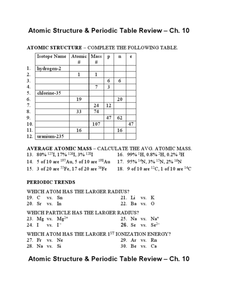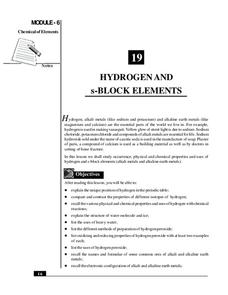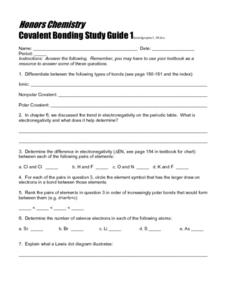University of Texas
Matter and the Periodic Table Chemical Families and Periodic Trends
Is assembling the periodic table as simple as Tetris? Scholars arrange colored cards into a logical order and then make connections to the arrangement of the periodic table. Hands-on activities include adding trend arrows and analyzing...
National Institute of Open Schooling
Periodic Table and Atomic Properties
An in-depth lesson, the fourth activity in a series of 36, begins with teaching how the periodic table's arrangement came to its current design. Using this knowledge, pupils then move on to analyze the arrangement of elements to their...
Pingry School
The Periodic Law
Time to put the knowledge to the test! Young scholars take what they know about the periodic table and build their own from scratch. Using clues from 26 different elements, they place elements in a blank periodic table. The clues include...
Curated OER
What are the Trends in the Periodic Table?
In this periodic trends worksheet, students fill out a portion of a periodic table with the atomic number, the atomic radius, the number of shells and the number of outer shell electrons for each element shown. They answer six questions...
Curated OER
Trends in the Periodic Table
For this trends in the periodic table worksheet, students plot the ionization energy vs. atomic number and they plot atomic radius vs. atomic number of the first 20 elements. Students analyze their graphs and answer questions about the...
Curated OER
The Periodic Table and Periodicity
In this periodic table and periodicity worksheet, students define 23 terms related to the groups and periods in the periodic table, the periodic trends, ions, and periodic law.
Curated OER
Unit 4 - Periodic Table
There are 17 multiple choice questions on this periodic table test. The focus is on properties of the elements by group and period. The exam is not formatted well, making it a little difficult to read. There is also a typographical...
National Institute of Open Schooling
General Characteristics of the p-Block Elements
The 20th installment in a series of 36 focuses on the characteristics of the p-block elements. Learners discuss, read about, and answer questions pertaining to the occurrence of these elements in nature, their electron configurations,...
It's About Time
Atoms with More Than One Electron
Provide young chemists with the ability to manipulate atoms and predict their results, in this sixth lesson. Pupils analyze energy patterns as they predict the amount of energy required to remove electrons from atoms. They compare trends...
Curated OER
Atomic Structure and Periodic Table Review
In this atomic structure and periodic table worksheet, students complete a table with isotopes, their atomic masses, the number of protons, neutrons and electrons and mass number. They also find the average atomic mass of atoms and...
It's About Time
Organizing a Store
When provided with multiple objects, how many ways can the class organize and display them based on predetermined factors? Assist class members with a handy activity—theoretically teaching them concepts to understand periodic...
Curated OER
Periodic Trends
Thorough explanations of the trends in the periodic table of elements make up the majority of this handout. Atomic and ionic size, ionization energy, electron affinity, and electronegativity are presented before giving chemistry...
Creative Chemistry
Physical and Chemical Trends in the Group 7 Elements
In this elements worksheet, high schoolers complete a graphic organizer by comparing the elements' melting point, boiling point, density, and electronic configuration. Students determine the characteristics of Group 7 elements. This...
Creative Chemistry
Trends in Physical Properties of Group 2 Elements
In this elements learning exercise, learners complete two graphic organizers by comparing the element symbol and melting point for given elements. Then students plot a graph of their atomic radius against proton number.
National Institute of Open Schooling
Hydrogen and s-Block Elements
Lesson 19 in the series of 36 analyzes the element hydrogen and the s-block elements. Through readings, answering questions, and discussion, learners write about and explain their occurrence, physical and chemical properties, and...
Curated OER
Periodic Trends
In this periodic trends activity, students determine the trends of electronegativity in the periodic table. Students compare electronegativity and ionization energy. This activity has 6 problems to solve.
Curated OER
The Halogens
In this chemistry worksheet, students answer 24 questions related to properties of halogens. They fill in the table with the correct answers and participate in teacher demo.
Curated OER
Periodic Table Trends
In this periodic trends activity, students solve ten problems related to elements in the periodic table. Students write electron configurations for atoms and they compare elements and their periodic trends.
Curated OER
Periodic Table Quiz Review Sheet
In this periodic table worksheet, students answer 10 questions about electronegativity, the groups of elements, atomic radius trends, electronegativity trends, ionization energy trends and properties of the elements.
Curated OER
Atomic Trend Practice
For this atomic trend worksheet, learners answer questions about trends in the periodic table such as ionization energy, atomic radii and electronegativity. They are given tables of elements and ions and they must identify which ones...
Curated OER
Atomic Electron Configuration and Chemical Periodicity
In this electron configuration and periodicity worksheet, students answer fifteen questions about periodic trends and they analyze orbital diagrams indicating location of electrons.
Curated OER
Elements
In this elements learning exercise, students write the electron configurations for given elements. Students describe ionization energy and electron affinity and the periodic trends for both. This learning exercise has 20 short answer...
Curated OER
Honors Chemistry-Covalent Bonding Study Guide I
For this covalent bonding worksheet, students answer questions about types of bonds, electronegativity, valence electrons, and Lewis dot structures. They answer specific questions about covalent bonds in molecules and explain the...
Beyond Benign
Green"er" Precipitation Reaction
All sodium carbonate may not have the same amount of carbonate, but it should have the same percent. Learners write and balance an equation to predict the chemical reaction between sodium carbonate and zinc acetate. Through the lab...

























